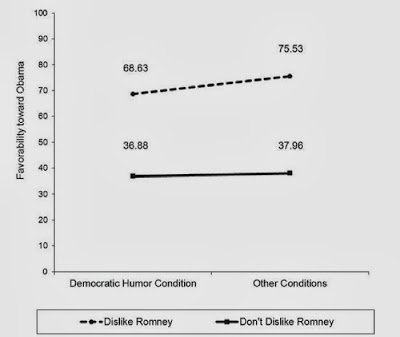Disposition, Political Parody, and the 2012 Election
Ever wonder about the impact of those political parody videos you were watching during the 2012 Election cycle? While you might have found it funny to see Barack Obama or Mitt Romney made fun of, were others finding these things funny as well? Was anybody else watching?
A new article I just published in Human Communication Research addresses these questions and more by applying the disposition theory of humor to the study of both political parody appreciation and the effects of humor exposure.
First, a little background: The Pew Research Center reports that 55% of all registered voters went online during the 2012 Election cycle to watch political video. 37% watched humorous or parody videos dealing with political issues. So yes, you weren't the only one watching those YouTube clips.
The research featured in the HCR article is based on an experimental study that asked subjects to watch one of three sets of videos: a set that featured Democratic-directed humor, one set that included Republican-directed humor, and apolitical content that acted as a control. Within each video set, subjects saw an original video clip (a music video) and then the parody version. For the Democratic-directed humor set, the original video was the Gotye song, "Somebody that I Used to Know," while the parody version was a song that went viral called, "Obama that I Used to Know." For the Republican-directed humor set, the original video was Psy's popular, "Gangnam Style," while the parody version was the song, "Mitt Romney Style," created and promoted by CollegeHumor.com. The apolitical cells featured the Carly Rae Jepsen song, "Call Me Maybe," and the Sesame Street parody, "Share it Maybe," sung by the lovable Cookie Monster.
When analyzing parody appreciation, the results first suggested that disposition (or how much you like Obama or dislike Romney) had a differential impact on humor appreciation. Specifically, those who liked Obama were less likely to appreciate the Democratic-directed humor and more likely to appreciate the Republican-directed humor that attacked Mitt Romney. At the same time those who disliked Romney were less likely to appreciate Democratic-directed humor targeting Obama, but more likely to appreciate the "Mitt Romney Style" clip that poked fun of the Republican nominee.
The study also looked at the interplay between disposition, type of comedy watched, and resulting effects on attitudes -- in this case post-test favorability toward Romney and Obama. The results highlighted a significant effect on attitudes toward Obama for those who dislike Romney and were exposed to the Democratic-directed humor attacking Obama. The bottom line: disliking a candidate and viewing humor where that candidate is the victor can dampen your attitudes toward the victim. For campaigns looking to manage the fallout from these viral parody videos, the research suggests that it may be quite valuable to work to quickly change the media narrative so that attack humor doesn't negatively impact how voters think about your candidate, particularly for those who already dislike the other guy.
Overall the research presents a timely and relevant case study and makes use of some really fun video content (see clips pasted below). From an academic standpoint, the study updates the use of the disposition theory of humor as a key framework in political communication research and also pushes the boundaries of the theory further to look not just at humor appreciation or processing but also humor effects.
Video Clips:
Gotye's "Somebody That I Used to Know,"
Democratic-directed humor: "Obama That I Used to Know,"
Psy's "Gangnam Style,"
Republican-directed humor: "Mitt Romney Style,"
Carly Rae Jepsen's "Call Me Maybe,"
Cookie Monster's "Share It Maybe,"


Comments
Post a Comment